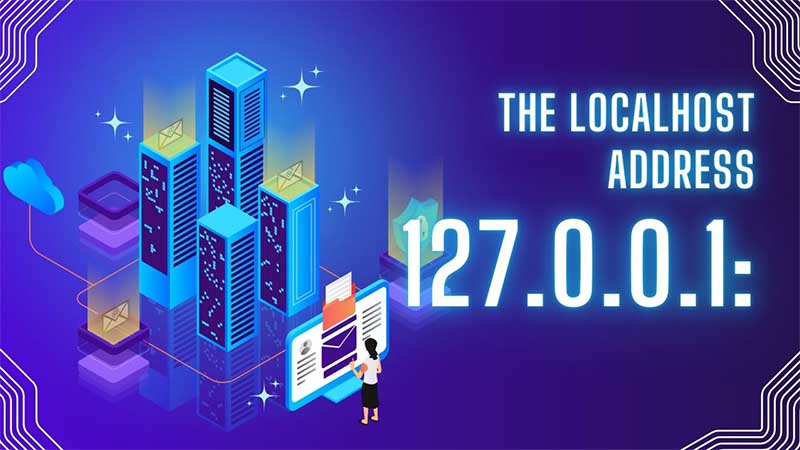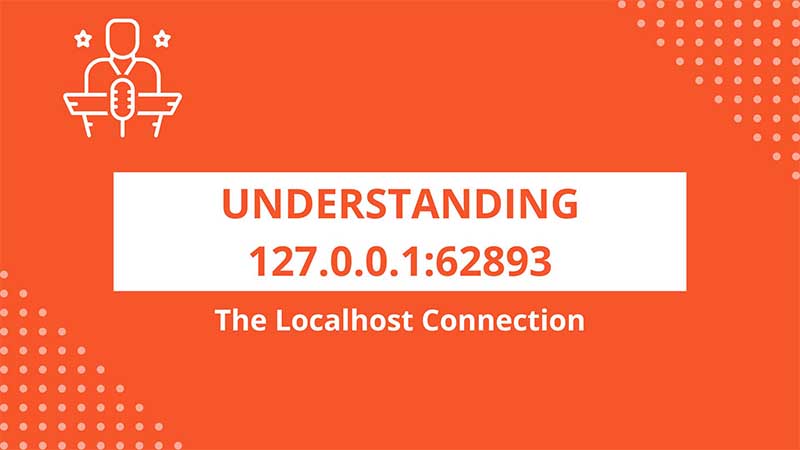In the world of computer networking, certain numbers and codes can seem mysterious to the uninitiated. One such combination that often appears in development environments is 127.0.0.1:62893. While it might look like a random string of digits, this address holds significant meaning in the realm of local network communications. Let’s demystify this code and explore its importance in software development and networking.
What is 127.0.0.1:62893?

What is 127.0.0.1:62893?
To understand 127.0.0.1:62893, we need to break it down into two parts:
- 127.0.0.1
- 62893
127.0.0.1: The Localhost Address

127.0.0.1: The Localhost Address
127.0.0.1 is a special IP address known as the “localhost” or “loopback” address. It’s a fundamental concept in networking that allows a device to refer to itself. When a computer uses this address, it’s essentially talking to itself.
Key points about 127.0.0.1:
-
- It’s universal: Every computer recognizes 127.0.0.1 as its own address.
- It’s local: Traffic sent to this address never leaves the device.
- It’s useful for testing: Developers use it to test network applications without needing an external network connection.
62893: The Port Number

62893: The Port Number
The number after the colon (62893) represents a specific port. In networking, ports are like channels that allow different services or applications to communicate. While some port numbers are standardized (e.g., 80 for HTTP, 443 for HTTPS), others, like 62893, are often dynamically assigned for temporary use.
The Role of 127.0.0.1:62893 in Development
Now that we understand its components, let’s explore why 127.0.0.1:62893 is significant, especially in software development:
Local Testing Environment
Developers frequently use localhost addresses to create isolated testing environments. This allows them to run and debug applications without interfering with other network services or requiring an internet connection.
Debugging and Troubleshooting
When developers encounter the address 127.0.0.1:62893 in error messages or logs, it often indicates that an application is trying to communicate with a local service. This information can be crucial for identifying and resolving issues during the development process.
Security Benefits
By using localhost addresses, developers can test potentially vulnerable applications in a safe, isolated environment. This reduces the risk of exposing sensitive information or untested code to external networks.
Common Scenarios Involving 127.0.0.1:62893
Let’s look at some real-world situations where you might encounter this address:
-
- Web Development: When building a website, developers often run local servers that listen on addresses like 127.0.0.1:62893.
- Database Testing: Setting up and testing database connections locally often involves using the localhost address with various ports.
- API Development: Developers may use 127.0.0.1:62893 when creating and testing APIs before deployment.
- Networking Tools: Some network diagnostic tools use localhost addresses to test local network stack functionality.
The “Disconnected from the target VM” Error
One common issue developers face is the error message: “Disconnected from the target VM, address: 127.0.0.1:62893”. This error typically occurs in development environments, especially when using Integrated Development Environments (IDEs) like Visual Studio Code.
Causes of the Error
Several factors can lead to this error:
- The target application or service is not running.
- Another program is already using the specified port (62893 in this case).
- Firewall settings are blocking the connection.
- There’s a mismatch in the port configuration between the IDE and the application.
How to Resolve the Error
If you encounter this error, try these steps:
-
- Ensure the target application is running.
- Check if another process is using port 62893 and close it or use a different port.
- Verify your firewall settings and add exceptions if necessary.
- Restart your IDE and the target application.
- Double-check the port configurations in your project settings.
Is It Safe to Expose 127.0.0.1:62893?
While using 127.0.0.1:62893 locally is generally safe, exposing this port to the public internet can pose security risks:
Potential Risks
- Unauthorized Access: If misconfigured, it could allow external users to access local services.
- Data Breaches: Sensitive information might be exposed if the service running on this port isn’t properly secured.
- Denial of Service (DoS) Attacks: Public exposure could make the port a target for DoS attacks.
Best Practices
To maintain security:
- Use localhost addresses only for local development and testing.
- Implement proper authentication and encryption for any services that need to be publicly accessible.
- Regularly update and patch your software to address potential vulnerabilities.
Advanced Topics Related to 127.0.0.1:62893
For those looking to delve deeper, here are some advanced concepts related to localhost and port usage:
IPv6 Localhost
While 127.0.0.1 is the IPv4 localhost address, IPv6 uses ::1. As IPv6 adoption grows, developers may need to consider both in their applications.
Port Ranges
Understanding different port ranges can help in troubleshooting and application design:
- Well-known ports: 0-1023
- Registered ports: 1024-49151
- Dynamic/Private ports: 49152-65535
Network Address Translation (NAT)
NAT can complicate the use of localhost addresses in certain network configurations, especially in containerized or virtualized environments.
Frequently Asked Questions
To address common queries about 127.0.0.1:62893, here are some frequently asked questions:
Q1: Can other computers access my 127.0.0.1:62893?
A: No, 127.0.0.1 is a loopback address that only works on the local machine. Other computers cannot access services running on your localhost.
Q2: How do I find out what’s using a specific port on my computer?
A: On Windows, you can use the command netstat -ano | findstr :62893 in Command Prompt. On macOS or Linux, use lsof -i :62893 in Terminal.
Q3: Is 127.0.0.1 the same as my computer’s IP address?
A: No, 127.0.0.1 is a special loopback address. Your computer’s actual IP address on a network will be different.
Q4: Can I change the localhost address?
A: While it’s technically possible to change the localhost address, it’s not recommended as many applications and systems rely on 127.0.0.1 being the localhost address.
Q5: What’s the difference between 127.0.0.1 and 0.0.0.0?
A: 127.0.0.1 refers specifically to the local machine, while 0.0.0.0 means “all IP addresses on the local machine”. When a server listens on 0.0.0.0, it’s accessible from any of the machine’s network interfaces.
Best Practices for Working with Localhost and Ports
To effectively use localhost addresses and ports in development:
- Use consistent port numbers across your development team to avoid conflicts.
- Document the ports used by different services in your project.
- Implement proper error handling for connection issues.
- Use environment variables to manage port configurations across different environments.
- Regularly check for port conflicts, especially in microservices architectures.
The Future of Localhost and Port Usage
As technology evolves, the way we use localhost and ports may change:
- Container Technologies: Tools like Docker are changing how developers use localhost, often requiring more complex networking configurations.
- Serverless Computing: This paradigm shift may reduce the need for traditional localhost testing in some scenarios.
- Enhanced Security Measures: Future operating systems may implement stricter controls on localhost usage to prevent potential exploits.
Conclusion
Understanding 127.0.0.1:62893 is crucial for anyone involved in software development or network administration. This simple-looking address plays a vital role in local testing, debugging, and securing applications during development. By grasping its significance and best practices, developers can create more robust and secure applications.
Remember, while 127.0.0.1:62893 might seem like just another string of numbers, it represents a fundamental concept in networking – the ability of a computer to communicate with itself. This capability is at the heart of many development processes and tools we use daily.
As you continue your journey in software development or IT, keep in mind the importance of localhost addresses and port management. They are key to creating efficient, secure, and well-functioning applications in today’s interconnected digital world.
- More Topic:- How To Keep Your Pool Cool With Pool Cover















 Pool Tiles
Pool Tiles



